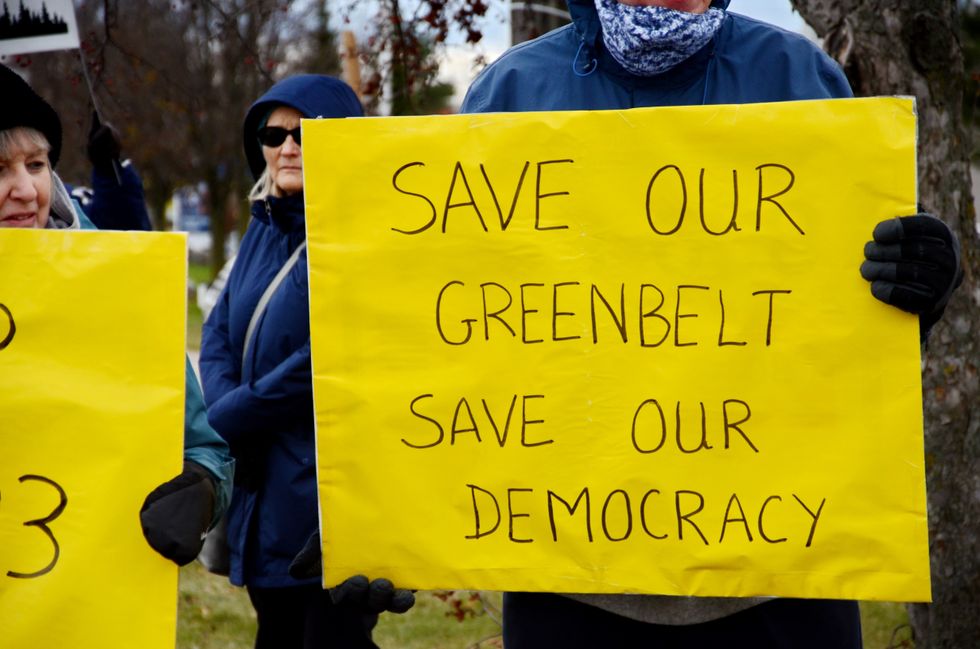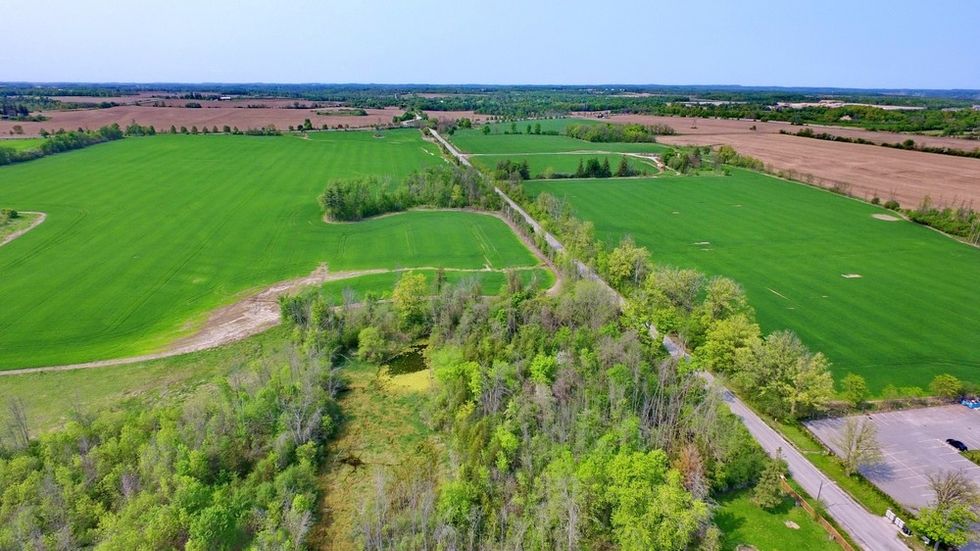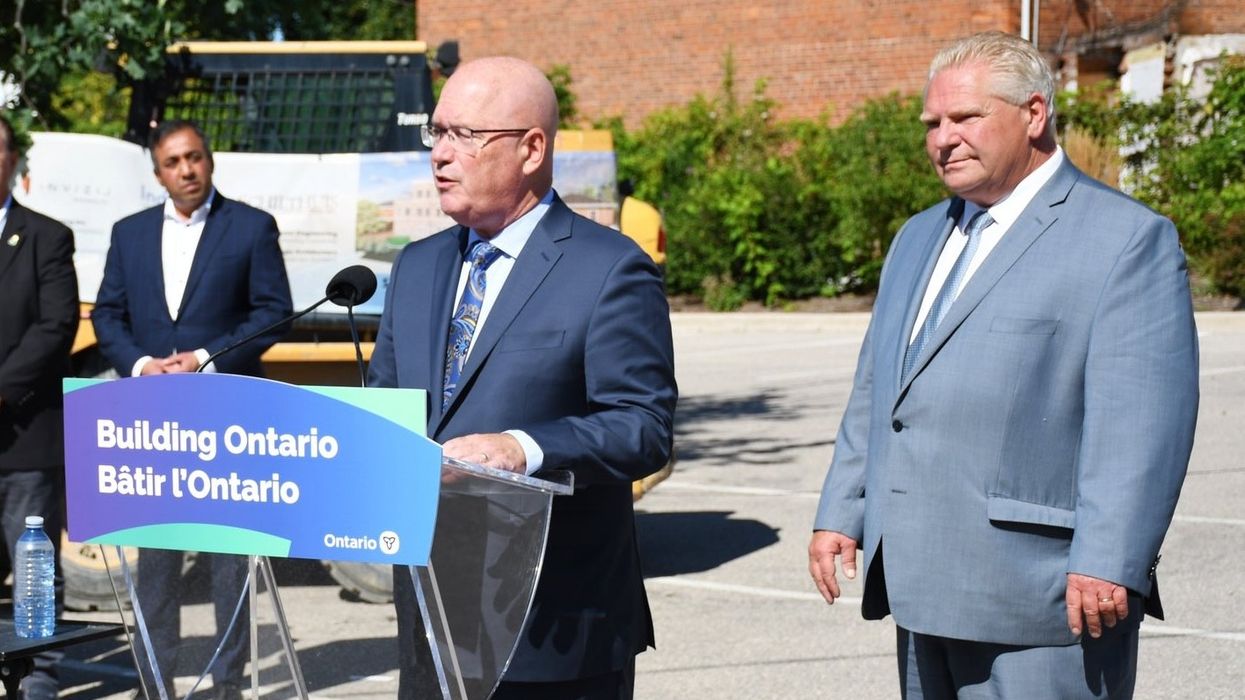The ‘Issue of the Year’ is part of STOREYS annual week-long editorial series. You can find the rest of our 2023 Ontario selections here as they're released throughout the week.
This year provided seemingly endless real estate issues to debate about around the dinner table, from a cooling housing market to crushing affordability to the eager anticipation of interest rate cuts. But looking back, there's one issue that stands clearly above the rest; one that's drawn the attention of civilians, activists, politicians, and even a government watchdog or two. It's the saga that just won't quit: the Greenbelt scandal.
Anyone following Ontario politics this year would have done well to invest in a neck brace, because the rate at which the government sped up, hit the breaks, and then completely changed course on its policies was whiplash-inducing. The Greenbelt scandal is not only a prime example of that, but it perfectly encapsulates the frustrations many Ontarians have with the Doug Ford government: its reluctance to hold corrupt officials accountable, and its willingness to listen to the average Ontarian over developer interests only when absolutely necessary (when the RCMP is turning their eyes on you and poll numbers are dropping).
To understand the full scope of the Greenbelt issue, we have to look back to the end of last year — November 2022, to be exact — to when the story first began. Well, from the public's perspective, anyway.
In The Beginning
Then-Minister of Municipal Affairs and Housing Steve Clark announced that 15 sites comprising nearly 3,000 hectares of land would be removed from the protected Greenbelt in southern Ontario and opened up for housing development — a surprising move considering Ford's previous years-long commitment that he "won’t touch the Greenbelt." (Granted, that commitment did only come following blowback from a leaked 2018 video showing Ford telling a room of developers that they were going to "open a big chunk" of the Greenbelt for homebuilding.)
Perhaps less surprising, reports started to emerge that big-name developers stood to profit immensely from the land removals, with some having suspiciously made fairly recent purchases of Greenbelt land. Both Clark and Ford maintained that no developers had been tipped off about the government's plans to remove protections.
Opposing politicians began making noise, including NDP Leader Marit Stiles who asked Ontario's Auditor General and Integrity Commissioner to look into the land removal. Stiles also noted that at least one developer who had attended Ford's daughter's $150-a-ticket stag-and-doe had their land taken out of the Greenbelt. By January, the Ontario Provincial Police (OPP) said they were looking to determine whether they should investigate the matter, and the Integrity Commissioner and Auditor General both announced they would be conducting separate investigations.

Still, the Province trudged forward undeterred from their plans, working with developers to help them plan to build, by the Province's estimate, 50,000 new homes touted as being affordable to Ontarian families. The Premier and Clark both insisted that the Greenbelt lands were needed to reach the Province's goal of building 1.5 million new homes by 2031, with Ford calling the Greenbelt protections "a big scam" and "a failed policy" from the previous government.
In February, a study came out that made the Ontario government's claims a bit harder to substantiate. It found that not only did Ontario not need Greenbelt lands to build 1.5 million new homes, but that it had enough land outside the Greenbelt for 2 million new homes.
The public continued with their outcries. Environmentalists sounded the alarm over future damage to the agriculturally sensitive lands, and others, like Ontario Liberals Interim Leader John Fraser, loudly decried the land removal as a way for Ford to "make his rich friends richer."
And yet, the push to build on the Greenbelt continued.
Stuck In The Middle
It wasn't until August that it seemed like the tide might change. After months of investigation, the Auditor General released her report — a scathing review of the Greenbelt land selection process that found it was done so in a rushed, biased, and non-transparent manner with preferential treatment given to certain developers. The AG similarly found that Greenbelt lands weren't needed to build housing in Ontario, but noted that for those developers whose properties were removed, they could see their land values increase by a staggering $8.3B.
Ford and Clark managed to make it out largely unscathed in the report, though, with almost the entirety of the blame being placed on Clark's Chief of Staff, Ryan Amato. Amato oversaw a team of six bureaucrats assigned to select the lands to be removed, and was responsible for suggesting 14 of the 15 lands that were ultimately taken out of the Greenbelt. He met with developers and accepted packets containing information on their Greenbelt lands. He even dropped environmental selection criteria when it didn't fit with the lands they were considering removing.
From the public's perspective, all signs pointed to Amato having to take the fall and lose his job — and possibly Clark along with him for letting a staffer go rogue on such a monumental piece of policy.
But for days afterwards, Ford and Clark said that Amato would continue on in his position, all while denying any knowledge of the less-than-stellar selection process he had orchestrated. Ford said he accepted the AG's findings, but denied any preferential treatment of developers.
Nearly two weeks later, Amato finally resigned.
But the hits kept on coming. At the end of August, the Integrity Commissioner released his report. It was equally as scathing, but this time, it blamed Clark directly.

The 166-page report said that not only did Amato effectively give developers a heads up about the government's plans to remove lands from the Greenbelt, but that Clark intentionally chose to "stick his head in the sand on such an important initiative." Because of his lack of oversight, the Integrity Commissioner found that Clark had violated multiple sections of the Members' Integrity Act.
Even after that, Clark wouldn't resign and Ford continued to back him, saying "he has a tough job."
Public outcry grew fiercer, and Ford was becoming visibly flustered by the stampede of questions he was facing about the reports, combating them with all-star-level verbal evasion tactics. At a press conference the day after the report came out, he lost his cool and personally went after Global News journalist Colin D'Mello when questioned about how Ontarians are supposed to trust the government to do its job properly. When scolded for attacking a journalist, Ford gave a Michael-Scott-esque apology: "I'm sorry if I offended his feelings."
A few days later, just after 9 am on Labour Day, Clark decided to resign from his position as Minister.
As someone who has given my life to serving the people through our democratic institutions, it is my responsibility to adhere to the principles of Ministerial accountability. I will continue to serve my constituents as the MPP for Leeds-Grenville-Thousand Islands and Rideau Lakes pic.twitter.com/5VvUMB43gi
— Steve Clark (@SteveClarkPC) September 4, 2023
But Ford only doubled down from there, announcing the following day that a full review of all Greenbelt lands would be conducted, overseen by his new Minister of Housing, Paul Calandra, with a nonpartisan, non-political facilitator. When asked whether this could lead to more land being removed from the Greenbelt, Ford left that door open, saying it "will be up to the Minister to make that decision."
In the midst of the reports, the OPP, in order to avoid a conflict of interest issue, referred the matter over to the RCMP, who said they'll evaluate whether to launch an investigation. Ford, despite claiming no knowledge of the process, said he is "confident" that nothing criminal took place in the Greenbelt matter.
The Beginning Of The End?
By late September, a third provincial politician had to resign because of the Greenbelt. Minister of Public and Business Service Delivery Kaleed Rasheed stepped down over a trip he took to Las Vegas with developer Shakir Rehmatullah, whose company owns lands that were removed from the Greenbelt. He had "mistakenly" given the Integrity Commissioner incorrect information about the trip.
The following day, September 21, is when the whiplash set in. Ford announced he would reverse course on his Greenbelt plans, saying "it was a mistake." For a government that, for nearly a year, had pushed forward with these plans — environmentalists, political opponents, and the Auditor General be damned — it was a sudden and shocking change of tune, perhaps most of all for the developers who had already started planning their new builds. But when poll numbers start dropping (by seven points in less than two months, per an Abacus Data report) action generally needs to be taken.
Unfortunately for the Ford government, returning the land didn't put an end to the Greenbelt story. A few weeks later, on October 10, the RCMP confirmed that it had launched a criminal investigation into the land removal.
In mid-October, the government brought forward legislation to officially restore all lands to the Greenbelt, as well as mandate that any future boundary changes to the Greenbelt be made through a "public and transparent process" that would require the approval of the legislature. The Province said that developers will not be compensated for costs associated with their land's removal, but that didn't stop two municipalities — Pickering and Grimsby — from requesting over $440,000 to compensate for money and staff time spent working on development plans for those removed Greenbelt lands. Calandra said he would review the costs and consider compensation.
Of course a month couldn't go by without the Greenbelt scandal rearing its head again, and in November that came in the form of Clark publicly stating that he will cooperate with the RCMP's investigation. He said he was "deeply remorseful" about the land selection process, and noted that although the RCMP had yet to contact him, he 'looks forward' to answering their questions.
Then, just last week, Calandra publicly apologized to developers for the government's mistakes with the Greenbelt during a speech at the Building Industry and Land Development Association's annual general meeting. He called it "a failing of government" and vowed to "not repeat those mistakes going forward." Calandra also made a direct apology to developer Silvio De Gasperis of the TACC Group of companies who had over 2,300 acres slated to be removed from the Greenbelt, and who infamously fought a summons from the Auditor General related to her investigation into the Greenbelt.
"To you, sir, I'm very sorry," Calandra said to De Gasperis, before adding "I'm sorry that we've never met."
Now heading into 2024, there's little chance that this will be the last we hear of the Greenbelt saga. The Ford government's tight connections with the development industry — too tight for some people's liking — have been well established, but the Greenbelt scandal brought to light in such an impossible-to-ignore manner the prioritizing of developer interests over the wishes of the average Ontarian. It shone a light on government process run amok, and a reluctance to hold those responsible accountable.
Ontario desperately needs more housing, there's no argument about that. But it's been made clear time and time again that the problem isn't available land, it's building capacity — we just don't have enough people to build the number of homes we need. To reach the Province's goal of 1.5 million new homes, housing starts would need to be supercharged, reaching levels well above even Ontario's best-performing year.
What started as a helping hand to a select group of developers has now led to multiple resignations, two scathing reports, an ongoing criminal investigation, municipalities seeking hundreds of thousands of dollars in compensation, and a loss of trust amongst Ontarians. Whether this serves as a lesson for the Ontario government to focus on the true issue at hand remains to be seen. An optimist would say yes, but a realist would say that history speaks for itself.






















